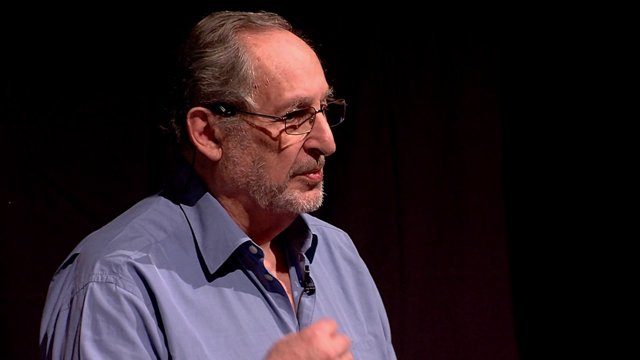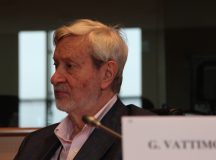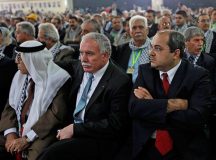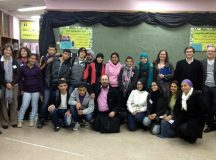Benjamin Pogrund argues that revising the national anthem could be an important symbolic step towards achieving the integration of Israel’s Arab citizens in Israeli society.
Israel is a Jewish state because that is the will of the majority; this will not change. It also has an Arab community, one-fifth of the population. They need to be embraced as citizens to fully share the country’s benefits and burdens. That is both the moral imperative of a democracy and it is in everyone’s interest to foster a sense of nationhood.
One of the goals must be to have Arabs as a natural part of the army, and until that day is reached, at least doing national service. Arabs have full citizenship rights which start, crucially, with the vote, but they are also victims of discrimination: inherited neglect in land, housing, education and employment must be dealt with. Work is being done; such as the task force set up in May by the government to promote Arab employment (a parallel committee will do the same for Haredim). These efforts need to go faster and deeper.
The charter of the Jewish National Fund (JNF) in restricting ownership and use of 13 per cent of Israel’s state lands to Jews must go. The argument that the charter is fixed in perpetuity is not sustainable: if, say, a trust had been set up in America in the mid-1880s to provide education for children of runaway slaves, it would be meaningless 150 years later because there would be no one to educate. The same with the JNF charter; it’s out of date and does not belong in the 21st century.
Israel’s Law of Return needs to be argued over between Jews and non-Jews. The Jewish majority insists that it is critical to the basis of the Jewish state but, sensibly, needs to heed the resentment it causes among the excluded minority. Despite what critics claim, the law is not unique to Israel; many countries provide preferential treatment, notably the right to return to Diaspora: Ireland, Lithuania and Greece included. The Israeli offence is that it applies only to Jews – which takes the debate into deep waters because of the claimed Palestinian right of return.
What else should and could be changed to demonstrate respect for the other and to foster a greater sense of nationhood among Arabs? Symbols are critical. They express a people’s history, culture and beliefs. Should the national flag be changed? The Star of David and the two blue lines are specific to the Jewish community. But Israel is not unique in having a flag which represents the majority: the flags of Britain, Scotland, Switzerland and others have the Christian cross and their non-Christian communities live comfortably with it; the same for non-Muslims in Muslim countries such as Pakistan which have the crescent.
What about the national anthem? Hatikvah (The Hope) is a powerful statement which binds together Jews in Israel and in the Diaspora. The words written by Naphtali Herz Imber were set to a Romanian melody in 1886 and soon became the official Zionist anthem. It is so strongly and emotionally Zionist that Arabs cannot relate to it. The issue was in the open when Supreme Court Justice Salim Joubran, an Arab, stood silently as the anthem was sung during a public ceremony in March 2012. Angry Jewish right-wingers wanted him dismissed, but Prime Minister Benjamin Netanyahu defended him, making it known that he understood Joubran could not sing the words such as ‘a Jewish soul yearns.’ The words could be adjusted, just as the new South Africa did in 1994 in blending the African National Congress’s Nkosi Sikele iAfrika (God Bless Africa) with apartheid’s Die Stem (The Call) in Afrikaans and English.
The Jewish Daily Forward, an American Jewish newspaper, has said that Hatikvah ‘was not born a sacred text; it became one.’ Through its language columnist, Philologos, the newspaper has suggested changing a few words. In the opening stanza, nefesh yehudi can be nefesh yisra’eli, the ‘soul of a Jew’ becoming the ‘soul of an Israeli.’ The eye that ‘looks for Zion’, le-tsiyon, can become to yearn ‘for our country,’ l’artseynu. The current closing stanza – which, it can be noted, was changed in 1948 when the State of Israel was born – is: Od lo avda tikvateynu /hatikva bat shnot alpayim /lihiyot am hofshi b’artseynu / eretz tsiyon ve’yerushalayim; ‘We still have not lost our hope /our 2,000 year old hope /to be a free people in our land /in the land of Zion and Jerusalem.’
Imber’s original words can be partly reinstated, for: Od lo avda tikvateynu /ha-tikvah ha-noshana /lihiyot am hofshi b’eretz avoteynu /b’ir ba David, David hana; ‘We have still not lost our hope /our ancient hope /to be a free people in the land of our fathers /in the city in which David, in which David encamped.’ Altering the national anthem is a touchy issue, and even explosive for some. It needs to be handled with the utmost sensitivity. Broadening its popular acceptance will not bring peace and harmony overnight. But together with other positive action it will contribute towards ensuring that all Israelis feel at home.
The dire urgency in this was emphasised by the violence among Arabs in July after the murder of Mohammed Abu Khedir from Shuafat in Jerusalem, following the murder of Naftali Frekel, Eyal Yifrach and Gilad Shaar in the West Bank. Angry emotions were heightened by a video showing Israeli policemen savagely beating Mohammed Abu Khedir’s cousin Tariq in demonstrations following his murder. Arabs say they enjoy less state and police protection than Jews and that the country’s leaders incite against them. Their view was further confirmed by the warning words of Prime Minister Benjamin Netanyahu: he said that Israeli Arab rioters cannot on the one hand throw petrol bombs and rocks, destroy property, call for the destruction of the state, and on the other hand enjoy the benefits of child allowance and National Insurance payments.
His description fits exactly what anti-Zionist Haredi rioters do from time to time. It would be unthinkable for Netanyahu to level the same threat against them.






































A far better idea would be to recognize that the Israeli state is composed of two nations, a Jewish majority and an Arab minority. Attempts to create a semi neutral national anthem does justice to neither. The best solution would to have two national anthems that would be played at public events and that recognize and celebrate the true diversity of the state.
If you were to be a minority in an Arab state and insist that in order for there to be harmony within that Arab state, they play their national anthem as well as a minority’s, you would be scoffed at in the least, in the most, you would be kicked out or shot. Why should democratic countries, in which these radical Muslims have sought refuge, change the way of life to the point of it’s own citizens rights being eroded. Because for over 60 years there has been an agenda, a silent virus like agenda, to infiltrate, breed and eventually as their numbers grow, to start making demands, for their laws, their way of living which have no intention of assimilating, but every intention of ensuring you are converted. How do you sing in harmony 2 national anthems, when one wants to obliterate the other?
Laura thanks for making sense of Benjamin Pogrund’s ludicrous post. Seriously our of touch! Besides your comments, South African blacks are not calling for the deaths of all whites, and in spite of the past there is an attempt at genuine reconciliation. Hardly the case in Israel with its Arab minority population whose own representatives in the Knesset never lose an opportunity to support terror, and for this same said population to call for an end to Israel on the streets while enjoying the protection of citizenship would not be tolerated in any other country other than Israel. This type of mentality as we all know encompasses much more than dislike for a national song. Hatikva is the national anthem of the Jewish people not just of Israel. As there is only one Jewish state and 57 Muslim states, I think to proudly affirm our national aspirations through this beautiful rendition of our hopes is completely appropriate.
“The charter of the Jewish National Fund (JNF) in restricting ownership and use of 13 per cent of Israel’s state lands to Jews must go.”
Why? It’s just 13%. Why not satisfy everyone? Have protected Jewish regions, protected Muslim regions, and mixed regions too.
To believe that a Jewish homeland is “no longer needed” is naive and unfair. For thousands of years, Jews were kicked out of nearly every place they ever called “home”. This happened in recent decades too, not just the distant past. Jews are arguably the most displaced people in history. The Holocaust is within living memory. Anti-semitism is rampant today. No one can realistically conclude that anti-Semitism is a “thing of the past.”
There are about 20 officially Christian nations, and about 30 officially Muslim nations. Why can’t there be just one Jewish state?
“Israeli Arab rioters cannot on the one hand throw petrol bombs and rocks, destroy property, call for the destruction of the state, and on the other hand enjoy the benefits of child allowance and National Insurance payments.”
Unclear what’s wrong with that statement.
“His description fits exactly what anti-Zionist Haredi rioters do from time to time. It would be unthinkable for Netanyahu to level the same threat against them.”
THAT’S the problem. Jewish rioters should be penalized same as Arab rioters.